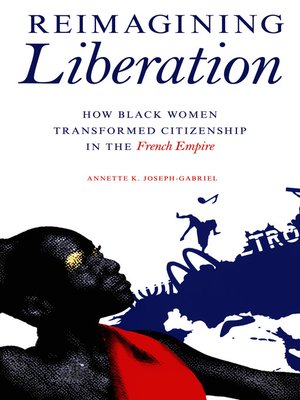Reimagining Liberation
ebook ∣ How Black Women Transformed Citizenship in the French Empire · New Black Studies
By Annette K. Joseph-Gabriel

Sign up to save your library
With an OverDrive account, you can save your favorite libraries for at-a-glance information about availability. Find out more about OverDrive accounts.
Find this title in Libby, the library reading app by OverDrive.



Search for a digital library with this title
Title found at these libraries:
| Library Name | Distance |
|---|---|
| Loading... |
Black women living in the French empire played a key role in the decolonial movements of the mid-twentieth century. Thinkers and activists, these women lived lives of commitment and risk that landed them in war zones and concentration camps and saw them declared enemies of the state. Annette K. Joseph-Gabriel mines published writings and untapped archives to reveal the anticolonialist endeavors of seven women. Though often overlooked today, Suzanne Césaire, Paulette Nardal, Eugénie Éboué-Tell, Jane Vialle, Andrée Blouin, Aoua Kéita, and Eslanda Robeson took part in a forceful transnational movement. Their activism and thought challenged France's imperial system by shaping forms of citizenship that encouraged multiple cultural and racial identities. Expanding the possibilities of belonging beyond national and even Francophone borders, these women imagined new pan-African and pan-Caribbean identities informed by black feminist intellectual frameworks and practices. The visions they articulated also shifted the idea of citizenship itself, replacing a single form of collective identity and political participation with an expansive plurality of forms of belonging.|
Cover
Title Page
Copyright
Contents
Acknowledgments
Prologue
Introduction
1. Suzanne Césaire: Liberation beyond the Great Camouflage
2. Paulette Nardal: Martinican Women as Political Protagonists in the Overseas Department
3. Eugénie Éboué-Tell and Jane Vialle: Refiguring Power in the French Union
4. Andrée Blouin: Métissage and African Liberation in My Country, Africa: Autobiography of the Blac
5. Aoua Kéita: Rural Women and the Anticolonial Movement in Femme d'Afrique: La vie d'Aoua Kéita racontee par elle-meme
6. Eslanda Robeson: Transnational Black Feminism in the Global South
Epilogue
Notes
Bibliography
Index
Back cover
|"Beautifully written . . . Annette Joseph-Gabriel's Reimagining Liberation: How Black Women Transformed Citizenship in the French Empire offers a bold new path for reimagining the freedom struggles of the twentieth century. " —Black Perspectives
"A transformative and unprecedented contribution. It recovers material, heretofore mostly unexamined, to identify each woman's local and global positionalities, that is, their national circumstances as well as the areas where they and their struggles intersect. Readers eager to learn about this historical and literary era will discover gems in this book."—Renée Larrier, author of Autofiction and Advocacy in the Francophone Caribbean
"Seven black women anchor Dr. Annette Joseph-Gabriel's, Reimagining Liberation, an inspired and original history of decolonization. These women's imaginings and practices of liberation politics and decolonial citizenship made them resilient political protagonists in a time of upheaval. In her important book, Joseph-Gabriel compellingly argues for doing far more of what she, Suzanne Césaire, Paulette Nardal, Eugénie Éboué-Tell, Jane Vialle, Andrée Blouin, Aoua Kéita and Eslanda Robeson have done: centering black women's experiences, politics and leadership within struggles to identify and challenge global systems of injustice."—Jennifer Boittin, author of Colonial Metropolis: The Urban Grounds of Anti-Imperialism and Feminism in Interwar Paris
|Annette K. Joseph-Gabriel is an assistant professor of French at University of Michigan.
"A transformative and unprecedented contribution. It recovers material, heretofore mostly unexamined, to identify each woman's local and global positionalities, that is, their national circumstances as well as the areas where they and their struggles intersect. Readers eager to learn about this historical and literary era will discover gems in this book."—Renée Larrier, author of Autofiction and Advocacy in the Francophone Caribbean
"Seven black women anchor Dr. Annette Joseph-Gabriel's, Reimagining Liberation, an inspired and original history of decolonization. These women's imaginings and practices of liberation politics and decolonial citizenship made them resilient political protagonists in a time of upheaval. In her important book, Joseph-Gabriel compellingly argues for doing far more of what she, Suzanne Césaire, Paulette Nardal, Eugénie Éboué-Tell, Jane Vialle, Andrée Blouin, Aoua Kéita and Eslanda Robeson have done: centering black women's experiences, politics and leadership within struggles to identify and challenge global systems of injustice."—Jennifer Boittin, author of Colonial Metropolis: The Urban Grounds of Anti-Imperialism and Feminism in Interwar Paris
|Annette K. Joseph-Gabriel is an assistant professor of French at University of Michigan.







